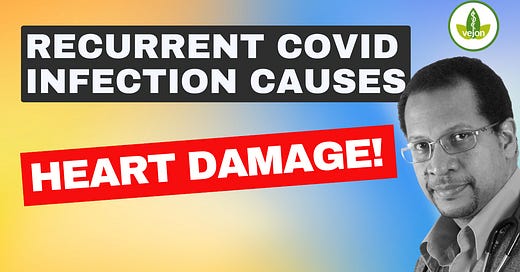Sharing some important updates and research on COVID-19. What I discuss may challenge some of the prevailing narratives, but from a scientific standpoint, the more we understand, the better prepared we can be. Recently, I came across information suggesting that Dr. Fauci has contracted COVID-19 again. This raised some important questions, particularly about the implications of recurring infections, especially after multiple vaccinations and boosters.
My focus has always been on finding solutions, and part of that involves staying informed about the latest research. One key area I've been studying is how the SARS-CoV-2 variants affect the heart, specifically cardiomyocytes, which are the cells that make up heart muscle. This is significant because damage to these cells can have serious long-term consequences, even if the current strain of the virus seems mild.
A recent study published on August 2, 2024, looked at how different variants of the virus, including Omicron, infect and damage these heart cells both in the lab and in living organisms. Interestingly, the Omicron BA.2 variant was found to be particularly efficient at infecting and injuring cardiomyocytes. This suggests that even mild cases of COVID-19 could potentially lead to significant heart damage, a concern that should not be underestimated.
Different variants exhibited distinct tropism, mechanism of viral entry and pathology in the heart. Omicron BA.2 most efficiently infected and injured CMs in vitro and in vivo, and induced expression changes consistent with increased cardiac dysfunction, compared to other variants tested…
…Increased infectivity of Omicron BA.2 is attributed to its ability to infect via endocytosis, independently of TMPRSS2, which is absent in CMs.Mok, Bobo Wing-Yee, et al. "SARS-CoV-2 variants divergently infect and damage cardiomyocytes in vitro and in vivo." Cell & Bioscience 14.1 (2024): 101.
In light of this, I've been emphasizing the importance of protecting the upper airways from viral penetration. Once the virus gets past the mucosal immunity, it can spread through the bloodstream and infect various organs, including the heart. This is particularly concerning with Omicron, which, unlike earlier variants, can infect cells without relying on a specific enzyme found primarily in the lungs. This change in how the virus enters cells might explain why Omicron is less likely to cause severe lung disease but more likely to damage other organs, like the heart.
This brings me to the broader issue of how we prepare for the long-term effects of recurring COVID-19 infections. While many people now view Omicron as a mild variant, the potential for cumulative damage, especially to vital organs like the heart and brain, is a serious concern. We need to be proactive in finding ways to mitigate this damage. One approach that I've personally adopted involves the use of Omega-3 supplements, which I believe could play a role in reducing inflammation and protecting against some of the long-term effects of the virus.
As we move forward, it's crucial that we continue to research and understand these risks. We must prepare for the possibility of widespread issues like heart failure, which I fear could become more common as Omicron infections continue. My goal is to share information and solutions that can help protect our health in the long run. If you're interested in learning more, please consider signing up for my newsletter, where I share detailed information on these topics.
Let's stay informed, hopeful, but also prepared for the challenges ahead. Thank you for joining me today, and take care.
Please support my research efforts by subscribing to Vejon Health Substack. Your support allows me to continue bringing you my insights in a timely and effective way.















Share this post